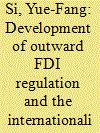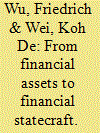| Srl | Item |
| 1 |
ID:
133810


|
|
|
|
|
| Publication |
2014.
|
| Summary/Abstract |
The Investment Development Path (IDP) model has been widely accepted for illustrating the relationship between the inward and outward foreign direct investment (FDI) positions of a country and its economic status based on the data from developed economies. In recent years, however, outward FDI from developing economies has increased dramatically and it has been argued that institutions are 'forefront' factors in addition to the economic index. In this article, we use statistical data from China, which has gone through dramatic regulation reform and FDI development, to test the validity of the IDP model. We also trace the history of Chinese FDI regulation development to answer the following question: in what way are regulations important for FDI in different periods? We use Lenovo as a case study to show how a Chinese firm 'avoids' and 'adapts to' regulation changes. We find that the FDI development of China still follows the IDP model; however, the Chinese government has accelerated the whole process through active regulation reform. In a transition economy such as China, FDI co-evolves with the regulation, and the firms which can influence or foresee the policy changes can prosper considerably.
|
|
|
|
|
|
|
|
|
|
|
|
|
|
|
|
| 2 |
ID:
133809


|
|
|
|
|
| Publication |
2014.
|
| Summary/Abstract |
Over the past few decades, China has accumulated over US$3.4 trillion of official foreign exchange reserves as it rises to become a global power. Do China's financial assets increase its ability to pursue its national interests internationally? With the globalisation and rising influence of Chinese state-owned enterprises, state-owned banks and sovereign wealth fund, as well as China's growing clout in several regional groupings, it is clear that China does possess the necessary mechanisms to assert its financial power. This article examines the efficacy and limitations of these mechanisms in Africa and Latin America, in the economic and political domains. In the economic domain, China has consistently used foreign oil contracts and acquisitions to secure direct oil flow from developing nations. An analysis of recent cases shows that while China is able to successfully harness its financial power in its pursuit of oil, it needs to fulfil its promises to the satisfaction of the recipient countries in order to maintain the value of its offers. In the political domain, China has used its financial assets to purchase diplomatic allegiance from various African and Latin American countries in support of its One-China policy. Studying both successful and unsuccessful cases reveals that while China is generally able to use its financial power in third-world countries against Taiwan successfully, its national goals have, in recent years, shifted to the economic realm, even with countries that still recognise the Taipei government.
|
|
|
|
|
|
|
|
|
|
|
|
|
|
|
|